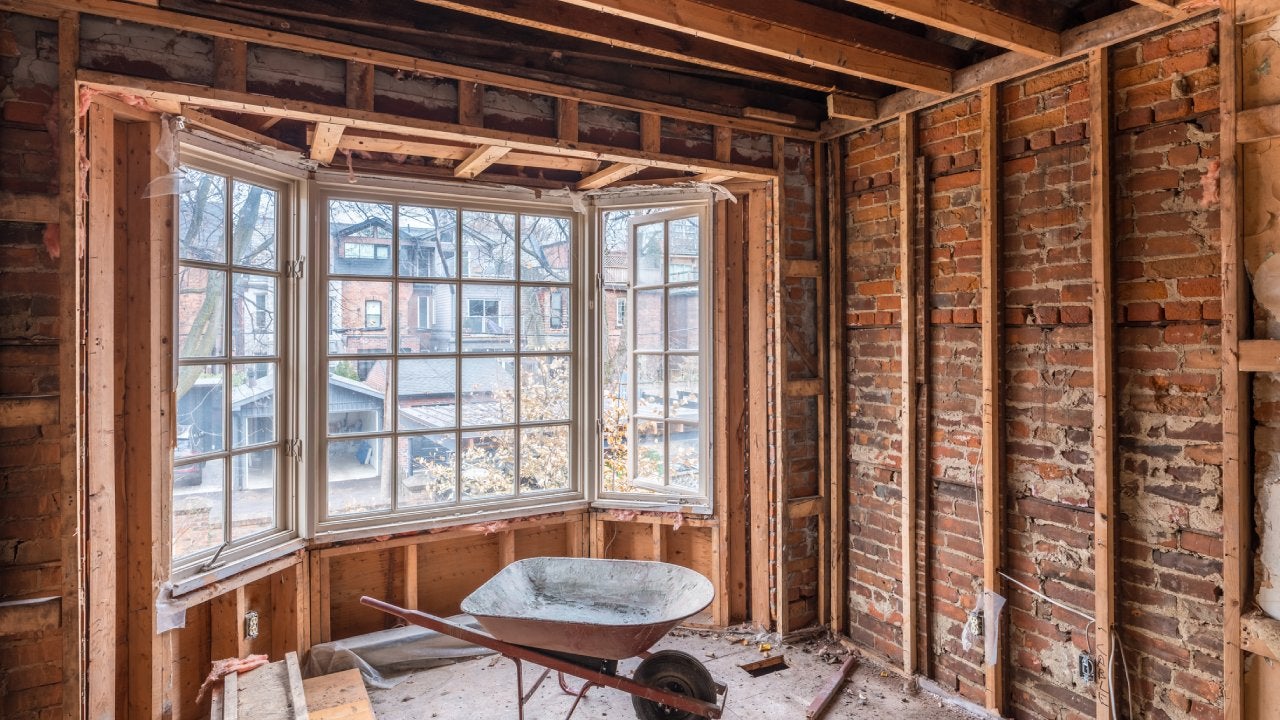8 tips for working with contractors

Home improvement and renovation projects require a significant amount of time, energy and investment. And if you don’t go the DIY route but prefer to hire professional help — as nearly seven in eight homeowners do — that means dealing with a home contractor or contractors.
It can seem a daunting task, and everyone has had or heard horror stories of botched jobs, infinite delays and out-of-control costs. So here are some considerations for dealing with contractors, from finding one to negotiating costs to working with them once the job starts.
1. Seek out a contractor who specializes
Finding a good, reliable contractor often feels like finding the proverbial needle in a haystack. One way to narrow things down is to focus on the type of project you have. Like many professionals, contractors often specialize: Some focus on new builds, others deal exclusively with renovations and remodels of existing spaces.
Further, some contractors specialize in particular rooms or spaces: bathroom/kitchen is a common field, for example (since both involve similar materials, cabinetry and plumbing).
So when you’re asking around, don’t just ask friends and family for a contractor — ask for a contractor who concentrates on the work you want done. (If you’re consulting an online search service like HomeAdvisor or Angi, that’s the first thing they’ll ask you.) For more intricate projects or those encompassing several specialties (plumbing, electrical wiring), you could consider hiring a general contractor, as one in four renovating homeowners do, according to the 2021 Houzz & Home Study. That contractor will then hire and supervise the subcontractors for you.
Ask the right questions
Chances are, you’ll be talking to multiple contractors when seeking “the one.” First question: Are they licensed for — and experts in — residential work, as opposed to commercial? (Some states issue licenses for general contractors, while others require them just for specialty trades). Then, how much experience (years, number of jobs) do they have with your type of project? Do they have pictures or references from other similar items they’ve completed? Do they have insurance? And, do they provide itemized contracts before beginning work? (More on that later.)
Most of all: Do they express genuine interest in your project? Are they really listening to you, or just rattling off services they provide?
2. Interview thoroughly and do your due diligence
After speaking to some on the phone, make a list of four to six contractors you want to meet in person. Doing this gives you some one-on-one time with them, allowing you to decide which one exudes the most expertise, and whether you feel comfortable working with them. When meeting in person, consider the following:
Professionalism
Do they arrive on time? If they’re late, do they notify you ahead of time? Moreover, when they arrive, are they collaborative? After all, you’re spending a significant amount of money on this project — they should value your ideas and input. And, do they provide you with an outline of the services offered, the time frame of completion and the payment schedule?
Research claims or references
Once a contractor leaves, it is up to you to do due diligence. Reach out to any references they provided — and they should provide several — to determine if the customer’s experience aligned with what the contractor stated. And you might also verify the contractor’s credentials with the appropriate state or city authority or licensing board (Angi provides a good verification resource).
3. Know how to evaluate bids
When collecting bids (get at least three), ask for itemized quotes. These allow you to see what exactly the contractor charges. They can itemize costs based on materials, labor, profit and any other expenses.
As a rule of thumb, materials account for up to 40 percent of the project costs, according to This Old House. Moreover, many contractors also assign a profit margin of around 15 to 20 percent. Therefore, you can use these numbers as a guide to see if a contractor is on the level about their pricing. If you’re on a tight budget, delineating all the costs can help you decide where to cut and what you can live without. Don’t be afraid to ask the contractor for economical substitutions.
Whatever you do, don’t accept “allowances.” An allowance is the money set aside for items not specified in the contract. You don’t want to give someone carte blanche to incur expenses without telling you and then sticking you with the bill.
Throw out the lowballs
It might be tempting to go with the cheapest bid. However, if one is significantly lower than the others, the contractor might be cutting a lot of corners. Don’t be afraid to ask “how can you charge so much less?”
Conversely, if one bid seems inordinately high — but you really like the contractor — ask them, “what goes into your higher price?” They may come down a bit, or you may discover that their fee includes services that other contractors didn’t include or nickel-and-dime you for, like cleanup.
4. Lay a paper trail
Once you’ve picked your pro, make sure to get everything in writing. Your contract or agreement with them should include all the project details, such as the work involved, the materials used, the timeline for completion, and the payment schedule. Moreover, if any changes happen once the job starts, you’ll want to document them as well. Think of it as a project journal that becomes an invaluable resource if disagreements arise.
5. Establish a payment plan
Work with your contractor to establish a payment schedule that works for both of you. Many contractors have a standard plan — such as a down payment (which often goes towards purchasing materials), then three successive payments. If possible, try to find out what’s typical for your region or project. This Old House recommends 10 percent of the project costs due at signing, three installments of 25 percent spread out at equal intervals and one final payment when the project is done.
Three things are key:
- Pay in installments (their pay is your chief means of leverage)
- Peg payments to the timeline (with provisions if work gets delayed or milestones aren’t reached)
- Never, ever pay in full until the job is completed — to your satisfaction
If a contractor wants more money upfront, it could indicate they’re in a cash crunch. Conversely, if they want the final installment before the job’s finished, they could take the money and run.
Again, never be afraid to negotiate.
6. Make sure they pull the permits
Many jobs, even small ones, require work permits from your city or county. Your contractor will handle getting these for you (and include any fees in the project costs). In fact, one thing to ask them is how familiar they are with the process for your locality (you know how government bureaucracies are). However, it is your responsibility to ensure they have all permissions in hand before work begins.
Meanwhile, if you live in a co-op, condo or other HOA community, make sure to seek approval from the board (if applicable) before allowing the contractor to begin the job. If the contractor knows your HOA, and has done a lot of work for the residents, that’s another plus in their favor: They know the rules about noise, hours and other restrictions.
7. Keep in communication
In designing the project, you have hopefully been clear about what you want, in terms of both materials and how you want the work to flow. Once the project starts, things should remain clear, and the channels of communication should be open. It helps if you stay in constant contact with your contractor — if not every day, then at regular intervals. Ask for periodic project reports or check-ins.
Be around to see how the work is going. Don’t be afraid to ask important questions, but show respect and don’t be constantly carping and second-guessing. If you can’t be there in person, consider installing drop cams to watch the work remotely.
8. Be firm but fair
Projects rarely run perfectly smoothly. Snags and delays are to be expected, especially when the job involves a lot of different moving parts, as with kitchen remodels. The contractor may find other items that require work or run into supplier delays. Be reasonable and try to distinguish between what’s the contractor’s fault and what is beyond their control. If a delay drags on, though, it’s perfectly fine to ask if there’s a workaround or plan B.
Delays are acceptable, to a certain extent; additional costs too, to a lesser extent. Any smart homeowner and contractor knows to budget in a little extra, for those unexpected extra expenses. But be sure you understand what the new costs are, and exactly why.
And, just as you wouldn’t want contractors to cheat you, don’t be stingy with them: Pay your installments on time — unless you have a good, project-related reason not to do so.
The bottom line on working with contractors
You want to keep things professional with the professionals. On the other hand, these people are in your home and in your life. So play nice.
You don’t have to be best friends, but it doesn’t hurt to offer workers coffee or water, or bring in pizza or snacks occasionally as a thank-you treat. Let folks go home early the day before a holiday; be understanding if they have to rush off for a family emergency (though have a word with the boss if these crises happen repeatedly). Such small gestures go a long way to letting the laborers know how much you appreciate their work.
And after the project’s all done, assuming you’re happy, post a well-written review on social media or send a thank-you note. Such moves can go a long way to cementing a relationship with that contractor — because you never know when you’ll have another home improvement project, and you need some professional help.
You may also like

5 commandments of investing in crypto

7 credit card tips for college students

6 things to know about renovating an old house



